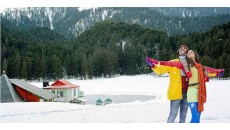
Jannat E Kashmir
- Location
- India
- Places to Visit
- Share
By signing up, I agree to Travelo's Terms of Service, Privacy Policy, Guest Refund olicy, and Host Guarantee Terms.
Already a Travelo member? Login
Don't have an account? Sign up
Kashmir-The state of Jammu & Kashmir (J&K) brings together three incredibly different worlds. Hindu Jammu and Katra, in the south, are the state's rail hubs and a major draw for domestic pilgrims. Muslim Kashmir is India's Switzerland, attracting hordes of local tourists seeking cool summer air, alpine scenery and Srinagar’s romantic houseboat accommodation.
Jammu-Steaming hot compared to the rest of the state, Jammu is J&K's winter capital. Pre-Independence the city was the seat of the powerful Dogra dynasty, whose palaces remain the city's most appealing sights. Religiously Hindu, Jammu dubs itself as the ‘city of temples’. Few of these temples are historically significant, and for foreign tourists there’s little pressing need to hang around after making transport connections to Amritsar, Srinagar or Dharamsala.
Pahalgam- Surrounded by alpine peaks, the Lidder and Seshnag Rivers tumble down picturesque, deep-cut mountain valleys covered with giant conifers. The surrounding mountains contain many beauty spots and more than 20 lakes, to which countless guides and horsemen are more than keen to take you.Not quite spoiling this great natural beauty is Pahalgam, sprawling 4km around the river junction. It's a major resort town offering golf and rafting and is a staging point for the midsummer Amarnathji pilgrimage.Hotels are likely to urge you to try a donkey hike or full-blown trek. In fact the best hiking often starts 12km away in Aru, a tiny village set in magical upland landscapes amid the foothill peaks. Aru (elevation 2440m) is increasingly used as a starting base by backpackers who blow straight through Pahalgam with just a change of vehicle.
Gulmarg- If you're looking for extreme skiing in high-altitude powder, Gulmarg might be the dream winter sports destination you've been looking for. In summer, however, think twice. In warmer months the aging, two-stage gondola is overloaded by Indian tourists, many seeking their first encounter with snow. While there's bracing air and wide (though hazy) views from the top, the queues for tickets and further interminable waits between stages mean that what might have been a pleasant quick jaunt can end up taking all day.
Srinagar- Ringed by an arc of green mountains, Srinagar's greatest drawcard is mesmerisingly placid Dal Lake, on which a bright array of stationary houseboats form a colourful scene and a unique opportunity for romantic chill-outs. Famous Mughal gardens are strung out over several kilometres around the lake's less urbanised eastern shore; these contrast with a fascinatingly chaotic old city centre that is topped by a fortress and dotted with historic wooden mosques. Add in a mild summer climate, feisty Kashmiri cuisine and the (highly disputed) tomb of Jesus Christ, and you have one of India’s top domestic tourist draws.
Sonmarg- Sonmarg means “meadow of gold” Sonmarg is the home of many beautiful & serene lakes. Sonamarg lies in Sind Valley streamed with flowers and surrounded by mountains. Sonmarg is also the base for some interesting treks to the high altitude of Himalayan Lakes.
Vaishnodevi- In a cave within a forested mountain rising steeply above Katra, the Vaishno Devi Shrine was popularised in the 1990s songs of Gulshan Kumar, and has since become one of India’s busiest pilgrim sites. These days it attracts millions of domestic visitors, though the appeal is a little hard to understand for most non-Hindus.